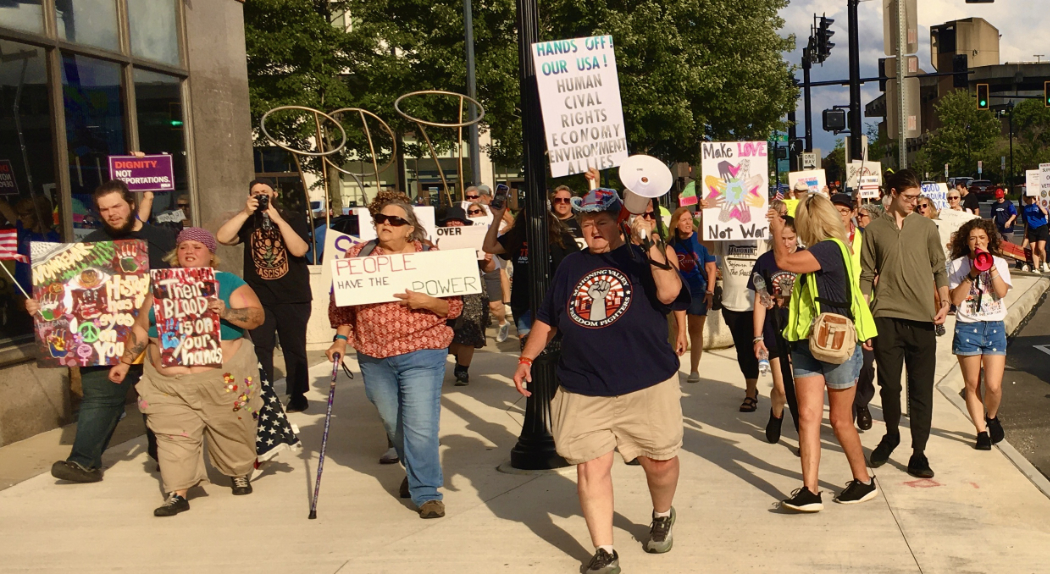Peaceful march honors life of late John Lewis

YOUNGSTOWN — Joan Firestine is old enough to remember the turbulent and triumphant times during the Civil Rights Movement in the 1960s, but she fears such progress is being eroded and turned backward — and that once again, people must nonviolently fight back.
“I marched in the Civil Rights Movement when I was a kid,” Firestine, 73, said. “It’s just so important to stand up for our democracy and our rights.”
Firestine and her daughter, Sara Kudeca, did just that via joining more than 300 educators, students, veterans, community leaders and others who took part in a peaceful vigil and march Thursday that began and ended at the Mahoning County Courthouse, downtown.
The two-hour gathering was to honor the late Georgia congressman and civil rights icon John Lewis on the fifth anniversary of his death July 17, 2020, from cancer. Lewis was 80.
Hosting the event were the Mahoning Valley Freedom Fighters and Good Trouble Trumbull.
Lewis epitomized the philosophy of nonviolent protest and often spoke of the importance of getting “into good trouble, necessary trouble” as a means to stand and fight against segregation, racism and other societal wrongs.
Lewis’ approach is vitally important to follow en masse regarding standing firm against today’s hate, racism and erosion of many people’s rights, Firestine said, adding that not just blacks today, but immigrants are bearing the brunt of hatred at the federal level.
Adopting the mantra of peaceful protest must be a tool used to fight against rights being stripped from immigrants and others, Kudeca of Boardman, said.
Immigration and Customs Enforcement raids and immigrants disappearing off the streets in this country are rooted in pure hate and racism — something that amplifies the need for a persistent and peaceful response, Kudeca explained.
“We need to elevate the Civil Rights Movement’s legacy. I feel our response is to be out here causing good trouble, necessary trouble,” Helana Komsa, a Mahoning Valley Freedom Fighters member, said. “We must stand up to injustices and daily, carry on his legacy and continue the good fight.”
If she had an opportunity to meet Lewis today, Komsa said she would further seek his guidance and advice regarding nonviolently combatting today’s authoritarianism in the U.S. and how he feels hers and others’ voices could be heard more loudly. She also would inquire whether Lewis was proud of what today’s protesters are doing to stand against the President Donald Trump administration, as well as ways to “advocate for others who can’t advocate for themselves,” Komsa added.
“John Lewis embodied citizens participating in government in peaceful ways,” Carla Canuatti of Girard, said, adding that such redress is critical today as people’s civil rights continue to be “trampled upon.”
This must be done consistently in today’s political climate, and all people, regardless of color, sexual orientation or where they’re from deserve to be treated with respect, dignity, empathy and compassion, Canuatti added.
The three-quarter mile march began at the county courthouse and proceeded along West Federal Street, Fifth Avenue and Commerce Street before returning to the courthouse. Along the way, participants’ chants included “No retreat, no fear, good trouble brought us here”; “The people won’t be still, good trouble is our will”; and “Hey hey, ho ho, Donald Trump must go.”
Many carried signs that read, for example, “Democracy dies in silence”; “Impeach, convict, remove the Trump regime now”; “I need to tell my grandchildren, I did not stay silent. Good trouble”; and “Fight the banality of evil.”
Early in his life, Lewis thought he would become a Baptist preacher, and he attended American Baptist Theological Seminary in Nashville, Tennessee. He spent much of his childhood caring for, and preaching to, the family’s chickens at their Troy, Alabama, home.
In 1954, however, he heard on a local radio station for the first time a sermon Dr. Martin Luther King Jr. preached and was heavily influenced by the message that espoused the concept of the social gospel (applying biblical teachings to fit modern society’s needs and challenges).
In the early 1960s, Lewis became chairman of the Student Nonviolent Coordinating Committee, a key civil rights organization made up mostly of high school and college students that ran largely on consensus of what members felt was needed and right.
The civil rights leader also spoke at the Aug. 28, 1963, March on Washington for Jobs and Freedom before King delivered his famous “I Have a Dream” speech, and on March 7, 1965, Lewis suffered a skull fracture on the Edmund Pettus Bridge in Selma, Alabama, a day infamously known as “Bloody Sunday” when Alabama state troopers attacked about 600 peaceful marchers.
In all, Lewis was arrested about 45 times for his “good trouble,” but he held firm all of his life to his belief in the power of nonviolent protest to bring needed change, redemption and the ability “to fight for the soul of America,” he often said.
More recently, in 2016, Lewis led a sit-in at the U.S. House of Representatives regarding gun control in the aftermath of the mass shooting at a LGBTQ nightclub in Orlando, Florida. At the end of his life, during the COVID-19 pandemic, a masked Lewis, who also was a student activist, stood in Black Lives Matter Plaza in Washington, D.C., where he and others protested the death of George Floyd at the hands of a Minneapolis police officer.
Also, Good Trouble Trumbull is to host a vigil to honor Lewis. Good Trouble Lives On Extended is set for 10 a.m. Saturday on Courthouse Square in Warren.
